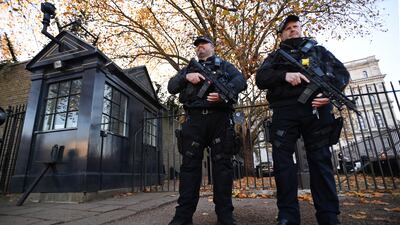Britain’s official threat level for international terrorism has been lowered to “substantial”, meaning an attack is likely but easing off the imminent danger of a deadly assault.
The public dashboard had been raised to “severe” after two terrorist attacks last year – an explosion outside a hospital in Liverpool on November 14 and the fatal stabbing of politician David Amess at a constituency surgery in Leigh-on-Sea in Essex on October 15.
The “severe” level had meant intelligence officials considered an attack to be highly likely.
On Wednesday, Vladimir Voronkov, under-secretary general at the UN’s Office of Counterterrorism, said ISIS still posed a threat to global security.
“Al Qaeda and ISIS, and their various affiliates, remain serious threats, while terrorist attacks based on xenophobia, racism, and intolerance are increasing,” he told the UN Security Council.
Home Secretary Priti Patel said the UK’s decision to reduce the threat level was made by the professionals on the country's Joint Terrorism Analysis Centre.
“JTAC judges that, despite these two attacks, the current nature and scale of the UK terrorist threat is consistent with the level of threat seen prior to the attacks,” she said.
“The attacks in October and November 2021 reflect the complex, volatile and unpredictable nature of the terrorist threat in the UK.
The “substantial” rating is the third highest – below “critical” and “severe” but above “low” and “moderate” – in the system used to assess the terrorism threat.

Despite the change, Ms Patel warned members of the public not to drop their guard.
“Any reduction in the threat level is positive but it must never make us complacent,” she said.
“Terrorism remains one of the most direct and immediate risks to our national security. The public should remain alert, but not alarmed, and report any concerns they may have to the police.”
Britain has experienced attacks by both Islamist and far-right extremists over recent years, including a May 2017 suicide bombing at an Ariana Grande concert in Manchester that killed 22 people. The threat level was raised to severe, the second-highest rung on a five-point scale, in November after an Iraq-born man blew himself up with a homemade bomb outside a hospital in Liverpool.
Emad Al Swealmeen, died when the device went off inside a taxi and the inquest after his death heard he bought 2,000 ball bearings and rented a “bomb-making factory” to manufacture a device with “murderous intent”.
The previous month, Sir David Amess was stabbed to death while meeting constituents in what police said was an act of terrorism.

Britain has experienced attacks by both Islamist and far-right extremists over the years, including the May 2017 suicide bombing at an Ariana Grande concert in Manchester that killed 22 people and injured more than 1,000 others.
The JTAC sets the threat level based on intelligence about international terrorism at home and overseas.
It has been at severe most of the time since 2014, briefly rising to “critical” amid a spate of violent attacks in 2017.
“These statistics are shocking and a stark reminder that the racism of anti-Semitism has not been eradicated,” Ms Patel said.
Last month the UK outlined new terror reforms for venues to protect the public after the Manchester Arena attack.
There is no current legal duty for venues to employ security measures at the vast majority of public places.
Mr Voronkov is urging nations to build on the momentum following the death of ISIS leader Abu Ibrahim Al Quraishi last week to target the group.
“Now is the time to address the grievances that ISIS and other terrorist groups exploit with their propaganda to attract new followers,” he said.
He said the terrorist group still had up to 10,000 fighters who pose a global threat.


